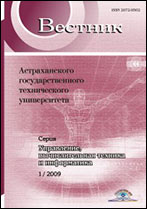|
INFORMATION TECHNOLOGIES IN EDUCATIONAL ACTIVITY
Specific features of educational programs for training digital economy staff
A. V. Proletarsky, T. I. Buldakova, A. W. Lantsberg
Bauman Moscow State Technical University, Moscow, Russia
Abstract:
The article considers the problem of training the staff for digital economy. It has been stated that large-scale work with digital data requires highly qualified specialists, especially in the field of computer science. It is shown that university graduates whose future professional activity is related to processing large arrays of poorly structured data should be able to apply end-to-end digital technologies. A list of such technologies with examples of relevant sub-technologies is given. The need for such specialists requires the development of new programs of higher education. The programs should contain educational modules aimed at developing the digital competencies that are in demand in the corresponding priority sector of the economy. The task of developing the programs of higher education containing such educational modules is investigated. The competence models of graduates developed by the universities, which include competencies necessary for the digital economy, are analyzed. The results of the analysis of the basic professional educational programs aimed at forming competencies for the use of end-to-end digital technologies are discussed. Assessment of the readiness of universities to develop such programs is given, as well as typical comments on the competence models of graduates and on updated basic professional educational programs are given.
Keywords:
digital economy, end-to-end digital technologies, digital competencies, competence models, educational programs, personnel training.
Received: 15.03.2023
Accepted: 13.04.2023
Citation:
A. V. Proletarsky, T. I. Buldakova, A. W. Lantsberg, “Specific features of educational programs for training digital economy staff”, Vestn. Astrakhan State Technical Univ. Ser. Management, Computer Sciences and Informatics, 2023, no. 2, 42–51
Linking options:
https://www.mathnet.ru/eng/vagtu751 https://www.mathnet.ru/eng/vagtu/y2023/i2/p42
|

| Statistics & downloads: |
| Abstract page: | 58 | | Full-text PDF : | 18 | | References: | 20 |
|




 Contact us:
Contact us: Terms of Use
Terms of Use
 Registration to the website
Registration to the website Logotypes
Logotypes








 Citation in format
Citation in format 